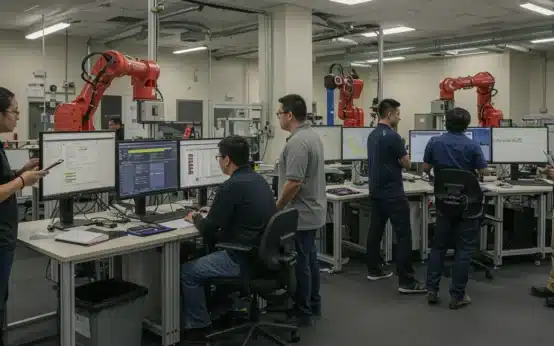Remote learning strategies involve using engaging tools, setting clear goals, and assessing effectiveness through student feedback and performance to enhance the online education experience.
Remote learning strategies are changing the way we engage with education today. Have you ever wondered how to make online learning more effective and enjoyable? Let’s dive into techniques that can really enhance your experience.
Understanding remote learning methods
Understanding remote learning methods is essential for both students and educators. With technology evolving rapidly, it’s important to keep up with different approaches to learning from a distance.
Types of Remote Learning Methods
There are various strategies employed in remote learning. Here are some popular ones:
- Synchronous Learning: This method involves real-time interaction between students and teachers through live classes.
- Asynchronous Learning: Students learn on their own schedule. They engage with recorded lectures and resources at their convenience.
- Blended Learning: A combination of traditional and online methods, allowing flexibility and varied learning environments.
Each method has benefits that cater to different learning styles. For instance, students who thrive on interaction may prefer synchronous learning, while those needing flexibility might find asynchronous learning more effective.
Choosing an Appropriate Method
When selecting a method, consider personal learning preferences and goals. Think about how you learn best. Do you prefer structured classes or do you need the freedom to explore topics at your own pace? Scientific research has shown that adaptability in learning approaches can result in better retention and understanding.
Additionally, technology plays a role. Ensure you have the tools needed for your chosen method, like a reliable internet connection and access to necessary software or platforms. As remote learning environments continue to evolve, staying informed about new methods and tools can significantly enhance your educational experience.
Overall, understanding different remote learning methods equips you with the knowledge to make informed choices. It empowers students and teachers alike to create an effective learning atmosphere, regardless of location.
Key tools for effective online education
Key tools for effective online education can greatly enhance the learning experience for students and educators alike. Identifying and utilizing the right tools ensures better engagement and comprehension.
Essential Online Learning Platforms
Many platforms cater to different learning styles. Here are a few important ones:
- Learning Management Systems (LMS): Tools like Moodle and Canvas allow teachers to create, manage, and deliver courses efficiently.
- Video Conferencing Tools: Zoom and Microsoft Teams enable real-time interaction, making remote classes feel more personal.
- Collaboration Tools: Google Workspace and Microsoft 365 promote teamwork through document sharing and collaborative editing.
Using these tools fosters interaction between peers and instructors, enhancing the online educational experience. Moreover, they help in breaking the barriers posed by physical distance.
Supplementary Resources
In addition to primary platforms, supplementary resources can boost learning:
- Digital Libraries: Access to vast resources like JSTOR or Google Scholar provides students with academic materials to support their studies.
- Educational Apps: Apps like Quizlet and Kahoot! make studying fun and interactive.
- Online Forums: Participating in forums like Reddit or specialized educational groups can offer peer support and diverse perspectives.
Implementing these resources not only provides additional learning opportunities but also encourages independent study and research skills. By integrating various tools, students can tailor their learning experiences to their individual needs.
Understanding the right combination of tools is vital. Evaluating which platforms work best for specific subjects or learning styles can lead to a more rewarding educational journey.
Creating an engaging learning environment

Creating an engaging learning environment is crucial for online education. It helps motivate students and enhances their ability to absorb information.
Elements of an Effective Learning Space
Several factors contribute to an engaging virtual classroom:
- Comfortable Setup: Ensure students have a quiet and comfortable place to study, which can help them focus better.
- Visual Aids: Use visuals like slides, videos, and infographics to make the learning material more appealing and easier to understand.
- Interactive Tools: Incorporate polls, quizzes, and discussions to keep students actively participating.
Each of these elements plays a significant role in enhancing student engagement. When students feel comfortable and involved, they are more likely to connect with the material and perform better.
Fostering a Positive Online Atmosphere
Building a positive online atmosphere is just as important as the tools used for teaching. Encourage open communication among students and teachers. This can be done by:
- Encouraging Questions: Make sure students feel comfortable asking questions during lessons.
- Providing Feedback: Offer constructive feedback that helps students improve and feel valued.
- Creating a Sense of Community: Use group activities to foster connections among students.
Fostering a sense of presence in an online class builds community and collaboration, which are essential for successful learning. When students feel like part of a community, their engagement levels tend to increase.
Utilizing different approaches to create a vibrant online learning environment can transform how students interact with the material. By using varied instructional strategies and maintaining open lines of communication, educators can create an engaging and effective learning experience.
Tips for maintaining motivation while studying remotely
Maintaining motivation while studying remotely can be challenging. It’s essential to implement strategies that keep learners engaged and focused on their studies.
Setting Up a Routine
Creating a daily routine helps establish a sense of normalcy. Sticking to a schedule keeps students on track. Here are some tips to help:
- Designate Study Hours: Choose specific times for studying each day. This consistency reinforces a productive mindset.
- Take Breaks: Plan short breaks to avoid burnout. Breaks refresh the mind and improve concentration.
- Limit Distractions: Find a quiet space to study. Keep away from phones and other distractions during study time.
Adhering to a routine not only boosts productivity but also provides a sense of accomplishment as students complete tasks on time.
Setting Clear Goals
Establishing achievable goals can enhance motivation, as clear objectives help students see their progress. Consider these strategies:
- Daily Goals: Break larger tasks into smaller, manageable goals.
- Celebrate Milestones: Reward yourself when you complete a significant task or reach a goal.
- Visual Reminders: Use charts or planners to visualize progress, which can serve as motivation.
Setting clear goals offers direction and a sense of purpose. Keeping track of achievements can further boost motivation, making the learning process more rewarding.
Additionally, engaging with others can help maintain motivation. Study groups or online discussions foster a collaborative learning environment. Sharing progress with peers encourages persistence and accountability. Overall, a mix of routine, goal-setting, and community can create a strong foundation for effective remote learning.
Assessing the effectiveness of remote learning strategies
Assessing the effectiveness of remote learning strategies is essential to understand their impact on student success. Teachers and institutions must evaluate various methods to enhance the learning experience.
Key Metrics for Assessment
Several key metrics can be used to measure effectiveness. These include:
- Student Engagement: Monitoring participation in classes and discussions helps gauge interest and involvement.
- Academic Performance: Comparing grades and test scores pre- and post-implementation of strategies can indicate success.
- Feedback Surveys: Collecting student feedback provides insights into what works well and what needs improvement.
These metrics allow educators to tailor their approaches, ensuring strategies effectively meet students’ needs.
Incorporating Technology for Evaluation
Leveraging technology can enhance the assessment process. Tools such as learning management systems (LMS) allow for data tracking and analysis. For instance, they can show how often students engage with learning materials. Other technologies, like analytics software, can analyze performance trends over time. By utilizing these tools, educators can better understand the effectiveness of their teaching methods.
Regular evaluations help refine strategies to boost achievement in remote learning environments. By staying updated on the latest educational research and technologies, educators can enhance their strategies further. Adjusting teaching methods based on assessments creates a more adaptive and effective learning environment.
Finally, collaboration among educators can lead to successful strategy assessments. Sharing findings and best practices with colleagues can lead to improved approaches in remote learning. This community-driven evaluation supports continuous growth and adaptation in teaching practices.
FAQ – Frequently Asked Questions about Remote Learning Strategies
What are some effective remote learning strategies?
Effective strategies include using engaging tools, setting clear goals, and maintaining regular communication among students.
How can I assess the effectiveness of my remote learning methods?
You can assess effectiveness by tracking student engagement, academic performance, and collecting feedback through surveys.
What tools can enhance the remote learning experience?
Tools like learning management systems, video conferencing platforms, and collaboration applications can enhance the online learning experience.
How can I keep students motivated during remote learning?
Maintaining motivation can be done by establishing a routine, setting achievable goals, and fostering a supportive online community.



 High-Growth Careers Without a Bachelor’s Degree in the US
High-Growth Careers Without a Bachelor’s Degree in the US  U.S. Community Colleges Adapt: 3 New Workforce Programs
U.S. Community Colleges Adapt: 3 New Workforce Programs  Higher Education Act Reauthorization: Impact on U.S. Students
Higher Education Act Reauthorization: Impact on U.S. Students